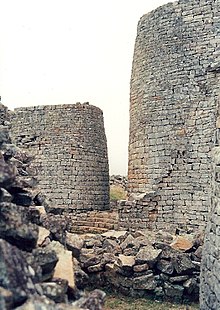Loading AI tools


Zimbabwe, officially the Republic of Zimbabwe, is a landlocked country located in southern Africa, between the Zambezi and Limpopo Rivers, bordered by South Africa, Botswana, Zambia an Mozambique.
| This geography-related article is a stub. You can help out with Wikiquote by expanding it! |
- People who will happily campaign for human rights in East Timor or the Middle East start to behave like the most rabid social Darwinists when you mention Zimbabwe’s whites. "Africa is a tough place and they were on top for a long time. It’s their turn to be dominated now," a friend I'd previously regarded as a liberal told me.
- Fergal Keane, in The Spectator (2002), as quoted in "Hating the white Africans" (14 November 2018), by James Myburgh, PoliticsWeb, South Africa
- We have fought for our land, we have fought for our sovereignty, small as we are we have won our independence and we are prepared to shed our blood…. So, Blair keep your England, and let me keep my Zimbabwe.
- Robert Mugabe, Speech at the Earth Summit in Johannesburg (2 September 2002), quoted in John Battersby and Andrew Grice, "Anti-West anger at summit as Mugabe rounds on Blair", The Independent, 3 September 2002, p. 1.
- When Cecil Rhodes sent in his agents to rob and steal in Zimbabwe, they and other Europeans marveled at the surviving ruins of the Zimbabwe culture, and automatically assumed that it had been built by white people. Even today there is still a tendency to consider the achievements with a sense of wonder rather than with the calm acceptance that it was a perfectly logical outgrowth of human social development within Africa, as part of the universal process by which man’s labor opened up new horizons. The sense of reality can only be restored by making it clear that the architecture rested on a foundation of advanced agriculture and mining, which had come into existence over centuries of evolution.
- Walter Rodney, How Europe Underdeveloped Africa. Howard University Press. 1972. p. 77. ISBN 978-0-9501546-4-0.
- Nationalism, as a political movement, has taken a variety of forms. In some cases a preexisting social unit defines itself as a nation and then endeavors to secure its own state. It also commonly happens in colonial situations, however, that a small local vanguard — typically a "middle group" between the colonial elite and the masses — is faced with the twin tasks of creating a nation out of formerly distinct social groups in order to underpin their legitimacy for taking the state. A third basic type of nationalism occurs when a small leading group secures the state and then engages a posteriori in processes of nation-building. Actually, the Zimbabwean case combines the latter two types of nationalism at different historical stages, and nationalism typically requires ongoing processes of nation-building or maintenance.
- Thomas Turino (20 June 2008). Nationalists, Cosmopolitans, and Popular Music in Zimbabwe. University of Chicago Press. p. 14. ISBN 978-0-226-81696-8.
Wikiwand in your browser!
Seamless Wikipedia browsing. On steroids.
Every time you click a link to Wikipedia, Wiktionary or Wikiquote in your browser's search results, it will show the modern Wikiwand interface.
Wikiwand extension is a five stars, simple, with minimum permission required to keep your browsing private, safe and transparent.